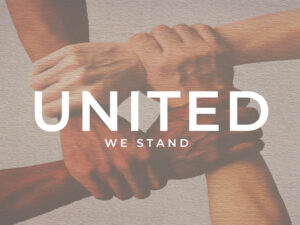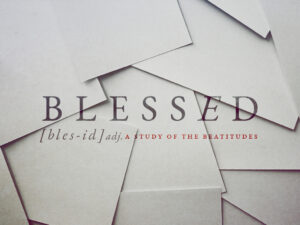Thank You!
 As I write this on Thursday, VBS is about to get started. It is always an exciting, tiring time filled with lots of activity. In the midst of all that, kids will have the opportunity to learn more about God and how much He loves them. It is a blessing for our church to be part of that process, but it could not happen without the efforts of many people.
As I write this on Thursday, VBS is about to get started. It is always an exciting, tiring time filled with lots of activity. In the midst of all that, kids will have the opportunity to learn more about God and how much He loves them. It is a blessing for our church to be part of that process, but it could not happen without the efforts of many people.As You Go
 Identity is a popular topic in our society. There are frequent debates about what defines who we are and what things are the most important. As Christians we often boil things down to a list of things we do, but being a follower of Jesus has always been something that should change our identity. In his book, A Door Set Open: Grounding Change In Mission and Hope, Peter Steinke writes about how easy it can be for congregations and individuals to lose sight of their mission. That mission is core to identity.
Identity is a popular topic in our society. There are frequent debates about what defines who we are and what things are the most important. As Christians we often boil things down to a list of things we do, but being a follower of Jesus has always been something that should change our identity. In his book, A Door Set Open: Grounding Change In Mission and Hope, Peter Steinke writes about how easy it can be for congregations and individuals to lose sight of their mission. That mission is core to identity.“In In his classic study, Transforming Mission, missiologist David Bosch reported that the Bible passage called the Great Commission, Matthew 28:18–20, was not understood to be primarily about mission until the early nineteenth century. Before then, the verses were read as part of the rite of baptism. Biblical scholarship has revealed that the mandate ‘Go!’ is not in the original Greek. It is a participle—’going.’ The translation would be ‘as you go.’ Theologian David Augsburger notes how broad the mission is with this simple change of ‘as you go’: ‘As you live, as you go about your daily work, as you move to new settings for service, as you join or create new communities of discipleship, as you fulfill your vocation as a follower of Jesus— you shall be witnesses. This is not a sales strategy. This is not a mandate for mass media. This is not a method for achieving church growth. This is a call to authentic, faithful witness in all of life.’”
Go therefore and make disciples of all nations, baptizing them in the name of the Father and of the Son and of the Holy Spirit, teaching them to observe all that I have commanded you. And behold, I am with you always, to the end of the age.” (Matthew 28:19-20)
Out of Brokenness and Into Unity
 In Galatians 3:28, Paul tells the Galatian church that they are now “all one in Christ Jesus.” For the Galatians who struggle with bringing together in one church people with very different backgrounds, that seems to be a challenge. In his book, Participating in God’s Life, Leonard Allen describes what is happening in Galatia as part of God’s greater work in the world to move people “out of brokenness and into unity.” It is the direction that God has been leading people toward since early in the book of Genesis. Allen continues:
In Galatians 3:28, Paul tells the Galatian church that they are now “all one in Christ Jesus.” For the Galatians who struggle with bringing together in one church people with very different backgrounds, that seems to be a challenge. In his book, Participating in God’s Life, Leonard Allen describes what is happening in Galatia as part of God’s greater work in the world to move people “out of brokenness and into unity.” It is the direction that God has been leading people toward since early in the book of Genesis. Allen continues:One episode in particular emphasizes a shift in direction or a new momentum in God’s plan. From the story of the Tower of Babel we learn that when humans, acting out of pride, seek to unify themselves, they are scattered and their languages are confused. With this in mind, jump ahead several thousand years to Pentecost. Here we see the coming together of many nationalities to hear God’s Word preached by Peter. But the results of Babel make this impossible—how can these diverse people understand the unifying message of Peter? Quite simply, God intervenes and allows the Apostles to speak in languages that everyone present can understand.The structure is the exact opposite of Babel’s: at Babel a unified humanity comes together to celebrate its own unity and is scattered by God; at Pentecost fragmented humanity comes together to hear from God and God makes that word available to everyone in their own language. The result is that unity, though not achieved, is given. The sign of this new unity is that many diverse people are baptized into one, unified name of Christ Jesus. Babel is reversed and continues to be reversed each time God remakes very different people into brothers and sisters.
Fear and Joy
 There is so much happening in the last chapters of Matthew, that it is easy to miss little details along the way. In the resurrection account that we looked at last week, one verse hit me differently than it has in the past. The women make the difficult walk to the tomb and are shocked to find it empty. Instead an angel is there with the standard angel message not to fear and another message that changes everything: “He is not here. He is risen.” They are told to take that message to the disciples, then verse 8 gives us insight into what those women were feeling. “So they departed quickly from the tomb with fear and great joy, and ran to tell his disciples.”
There is so much happening in the last chapters of Matthew, that it is easy to miss little details along the way. In the resurrection account that we looked at last week, one verse hit me differently than it has in the past. The women make the difficult walk to the tomb and are shocked to find it empty. Instead an angel is there with the standard angel message not to fear and another message that changes everything: “He is not here. He is risen.” They are told to take that message to the disciples, then verse 8 gives us insight into what those women were feeling. “So they departed quickly from the tomb with fear and great joy, and ran to tell his disciples.”Transitions
 One of the amazing things about scripture is that we can read it countless times and still find new things that we have not noticed in previous readings. Even if we are familiar with the stories of Jesus in one of the gospels, we might miss repeating words, phrases and organizational or structural elements. One of those easy-to-overlook phrases in the gospel of Matthew is “when Jesus finished.” Guided by the Spirit, Matthew uses this phrase five times to transition between the teachings of Jesus and the next part of the story.
One of the amazing things about scripture is that we can read it countless times and still find new things that we have not noticed in previous readings. Even if we are familiar with the stories of Jesus in one of the gospels, we might miss repeating words, phrases and organizational or structural elements. One of those easy-to-overlook phrases in the gospel of Matthew is “when Jesus finished.” Guided by the Spirit, Matthew uses this phrase five times to transition between the teachings of Jesus and the next part of the story.- Matthew 7:28 – “And when Jesus finished these sayings, the crowds were astonished at his teaching.” Here Jesus finishes the Sermon on the Mount and begins a series of miracles.
- Matthew 11:1 – “When Jesus had finished instructing his twelve disciples, he went on from there to teach and preach in their cities.” After preparing and sending out the 12, Jesus teaches throughout the area, primarily through a series of parables.
- Matthew 13:53 – “And when Jesus had finished these parables, he went away from there.” Following two chapters of teaching, Jesus spends the next five chapters moving between miracles and interactions with the Pharisees.
- Matthew 19:1 – “Now when Jesus had finished these sayings, he went away from Galilee and entered the region of Judea beyond the Jordan.” Jesus teaches about eternity and His purpose as He moves toward the beginning of His final week.
- Matthew 26:1 – “When Jesus had finished all these sayings, he said to his disciples, ‘You know that after two days the Passover is coming, and the Son of Man will be delivered up to be crucified.’” After two chapters talking about the destruction of the temple, His return and the judgment, Jesus will be betrayed, tried, beaten, executed and buried.
Spring Forward or Fall Back?
 Earlier this month we had that dreaded weekend where we lose an hour of sleep. For me it came on the heels of a flight delay adventure that kept me awake for 31 consecutive hours over the previous two days. I’ve never been a fan of moving the clock backward and forward each year, so I was excited (at first) when I heard the Senate was considering a bill to pick a time and stick with it. After a couple days, I learned that we tried that once before.
Earlier this month we had that dreaded weekend where we lose an hour of sleep. For me it came on the heels of a flight delay adventure that kept me awake for 31 consecutive hours over the previous two days. I’ve never been a fan of moving the clock backward and forward each year, so I was excited (at first) when I heard the Senate was considering a bill to pick a time and stick with it. After a couple days, I learned that we tried that once before.“America tried this before — and the country hated it. In the early 1970s, America was facing an energy crisis so the government tried an experiment. Congress passed a law to make daylight saving time permanent year round, but just for two years. The thinking was more sunlight in the evening would reduce the nation’s energy consumption.It didn’t work, said David Prerau, one of the nation’s foremost experts on the issue. ‘It became very unpopular very quickly,’ he told NPR.Americans do not like changing their clocks, but they disliked even more going to work and school in the dark for months — the price the nation had to pay for more sunlight in winter evenings.” (NPR, March 19, 2022)
Mission or Outrage?
 In his book, Christians in the Age of Outrage: How to Bring Our Best When the World Is at Its Worst, Ed Stetzer challenges followers of Christ not only to rise above the ever-lowering moral and ethical standards of the world we live in, but also to be aware of the attitude we might have towards those who celebrate those lower standards. The reason he gives for this challenge is simple: “You can’t hate people and engage them with the gospel at the same time. You can’t war with people and show the love of Jesus. You can’t be both outraged and on mission.”
In his book, Christians in the Age of Outrage: How to Bring Our Best When the World Is at Its Worst, Ed Stetzer challenges followers of Christ not only to rise above the ever-lowering moral and ethical standards of the world we live in, but also to be aware of the attitude we might have towards those who celebrate those lower standards. The reason he gives for this challenge is simple: “You can’t hate people and engage them with the gospel at the same time. You can’t war with people and show the love of Jesus. You can’t be both outraged and on mission.”“In the age of outrage, we are perpetually encouraged to view others purely in categories of friend or foe. Are they on my side or are they against me? Do they like my politics and politicians? Endorse my worldview? Embrace my ideology? Outrage is a product of the flesh. It is selfish, divisive, wrathful, and chaotic. In some cases, outrage pretends to be righteous anger, but underneath the veneer, it is simply driven by our fleshly desires. In contrast, engaging the Spirit takes the focus off us (our tribe, our desires, our anger, our anxieties) and places it on God and his glory. When we experience forgiveness in Christ, God entirely transforms the way we see people and communities.”
Hurry Up and Slow Down!
 In 1925, about half of the homes in the United States had electricity. Edison had introduced the incandescent light bulb a little over 40 years earlier. Alarm clocks gained popularity during those years, although the snooze button did not come around until the 1950’s. As homes added these innovations, everything began to change. Before that, the average American got eleven hours of sleep. Now the average is seven. Although we sleep less, we still think we never have enough time. Thus we are constantly in a hurry. Corrie Ten Boom, who spent years in a Nazi prison camp during World War II, described this new problem this way, “If the devil can’t make us bad, he’ll make us busy.” How can we live counter-culturally in a world that presses us to be in a hurry all the time?
In 1925, about half of the homes in the United States had electricity. Edison had introduced the incandescent light bulb a little over 40 years earlier. Alarm clocks gained popularity during those years, although the snooze button did not come around until the 1950’s. As homes added these innovations, everything began to change. Before that, the average American got eleven hours of sleep. Now the average is seven. Although we sleep less, we still think we never have enough time. Thus we are constantly in a hurry. Corrie Ten Boom, who spent years in a Nazi prison camp during World War II, described this new problem this way, “If the devil can’t make us bad, he’ll make us busy.” How can we live counter-culturally in a world that presses us to be in a hurry all the time?- Silence and Solitude – Mark 1:35, Luke 22:39 – How often do you have quiet time to yourself? If Jesus needed it, so do we.
- Sabbath (Rest) – Exodus 31:13, Mark 2:27 – Did you know that the average American touches his or her phone over 2600 times per day? The times that we used to be at rest are now spent with screens. God rested and gave His people the gift to do the same.
- Simplicity – Matthew 6:21, 2 Corinthians 1:12 – How many emails are in your inbox? How much stuff do we need? Could the stuff in your garage, shed or storage unit be used by someone else?
- Slowing – Ephesians 4:2, 1 Corinthians 13:4 – Sometimes we can notice unnecessary hurry in the times we are impatient. In his book, Comer suggests intentionally choosing the longest checkout line at the grocery store. Who does that? People who are not in a hurry do. Once at the front of the line, you can be a blessing to the cashier who likely need some of that.
Authentic Living
 For many Christians, there can be a disconnect between knowing and doing. We understand the right thing to do, but we do not always end up doing that thing. For others, they might even set out to do the wrong thing or have the wrong thoughts, while outwardly trying to portray a holy life. Jesus addresses this problem in the Sermon on the Mount.
For many Christians, there can be a disconnect between knowing and doing. We understand the right thing to do, but we do not always end up doing that thing. For others, they might even set out to do the wrong thing or have the wrong thoughts, while outwardly trying to portray a holy life. Jesus addresses this problem in the Sermon on the Mount.Overcoming Overthinking
 On Wednesday evenings, we have been studying people in scripture who have encounters with God. Each week we have talked about what we can learn about God through those encounters. In those stories, we can also see common issues that people have. In the stories we have covered so far, it seems that people struggle understanding themselves and the situations they face in the same way that God does. Because of how they perceive their abilities or the obstacles they face, they tend to overthink which leads to foolish actions.
On Wednesday evenings, we have been studying people in scripture who have encounters with God. Each week we have talked about what we can learn about God through those encounters. In those stories, we can also see common issues that people have. In the stories we have covered so far, it seems that people struggle understanding themselves and the situations they face in the same way that God does. Because of how they perceive their abilities or the obstacles they face, they tend to overthink which leads to foolish actions.
